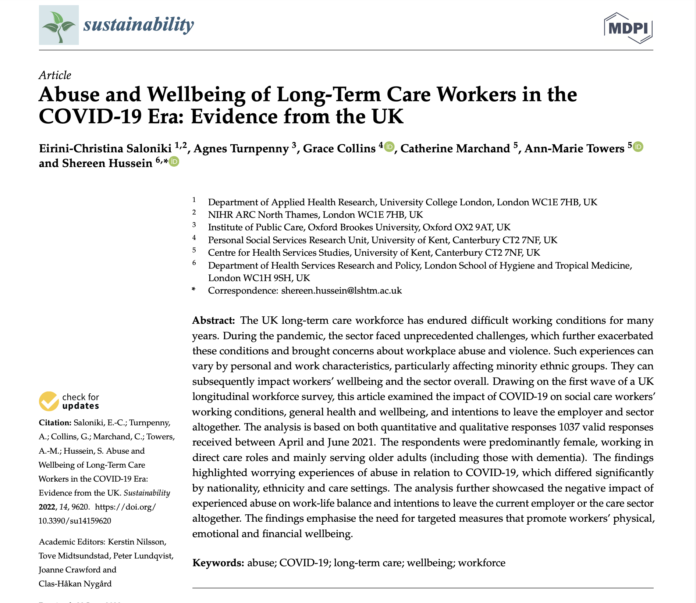The COVID-19 pandemic created significant challenges for the UK’s long-term care (LTC) workforce. In this new publication, based on the RESSCW study, we examine the impact of COVID-19 on social care workers’ working conditions, general health and wellbeing, and intentions to leave the employer and sector altogether.
The increased volume of tasks during the pandemic resulted in higher workloads among existing staff. In addition, lack of adequate PPE, staff shortages exacerbated by sickness-related absences, and a workforce with a high proportion of low-paid and precarious workers created a ‘perfect storm’ for adverse working conditions. The first wave of the pandemic saw an apparent decline in care workers’ health and wellbeing and brought to light concerns about mistreatment of the workforce in the form of workplace abuse and violence.
The analysis is based on both quantitative and qualitative responses of 1037 valid responses received between April and June 2021. The RESSCW team designed the survey in consultation with the steering group and the funder of the project (The Health Foundation). The longitudinal survey design was informed by the findings from an earlier ‘pulse survey’ conducted in the summer of 2020, followed by qualitative interviews with stakeholders as part of the same study. The survey included multiple-choice questions with pre-recorded and free text options to best capture the workers’ views and characteristics. The questions covered basic demographic information, working conditions, support, general health, wellbeing, intention to leave employer or sector, experience during COVID-19, such as mistreatment and abuse, and COVID-19-specific topics (including vaccination, infection of staff and clients, and isolation).
Our study found that a quarter of respondents experienced some form of abuse in relation to the pandemic. Looking at the relationship between experiencing abuse and wellbeing, the findings show that, irrespective of the measure used (i.e., proxy or work-life balance; different abuse indicators), abuse negatively impacts workers’ wellbeing. More severe (i.e., multiple types) abuse has a more adverse negative effect on wellbeing. When focusing on the impact of each abuse type, while the relationship remains negative and strongly significant for all types except for threat, the adversity of the effect differs by the wellbeing measure used. Specifically, bullying impacts the most on the proxy wellbeing measure, whereas physical violence affects work-life balance.
The negative experiences of abuse identified in this study stress the importance of considering the broader implications for workers’ health and wellbeing, the organisation and the sector. For instance, our results showed a negative association between abuse and work-life balance irrespective of abuse type. Consistent with similar studies, we found that many LTC workers frequently felt tense, uneasy, depressed and gloomy because of their job, with further implications on their general health and work-life balance. In addition, workers’ intention to quit the sector was found to be about half of that quitting the current employer voluntarily in the next year. The direction of these findings showcases the strong motivations of the care workforce for joining the sector and the hope that a change of employer will result in better working conditions. Despite all the challenging experiences faced before and during the pandemic, the workforce remains highly committed to the sector.
In an era of continued challenges, including austerity, a new post-Brexit immigration system and changes in practices to allow for a more flexible work model following the global COVID-19 pandemic, there is a call for targeted interventions to focus on more supportive jobs that will improve workers’ wellbeing at work. It is not just about maintaining adequate standards and building relationships with the care workforce but also emphasising all aspects of wellbeing—physical, mental and financial—that can pave the way forward.
This study highlights issues of considerable policy importance. The first is acknowledging the implications of COVID-19, including the increased levels of abuse and mistreatment, on the LTC workers’ wellbeing and ensuring adequate interventions to mitigate them in place. This is of high policy relevance to ensure a sustainable workforce. However, a recent government inquiry report assessed the government’s response to the health and social care workforce wellbeing as inadequate. It highlighted the differentiated experiences across different groups of workers and between health and social care settings in England. This lack of recognition of the impact of COVID-19 on the LTC workforce in the UK was reflected in minimal support measures during the pandemic compared to other countries such as Australia and Canada. The second policy implication is the linkage between the exposure to mistreatment and abuse and the intention to quit. With current workforce recruitment challenges and high turnover rates, it is crucial to implement interventions aimed at reducing incidences of bullying and abuse to minimise the haemorrhage of talents and wasted training and skills.
Citation: Saloniki, E.-C.; Turnpenny, A.; Collins, G.; Marchand, C.; Towers, A.-M.; Hussein, S. Abuse and Wellbeing of Long-Term Care Workers in the COVID-19 Era: Evidence from the UK. Sustainability2022,14,9620. https://doi.org/ 10.3390/su14159620
sustainability-14-09620Founder and Director
Shereen Hussein is a Health and Social Care Policy professor at the London School of Hygiene and Tropical Medicine (LSHTM), United Kingdom.
Shereen Founded the MENARAH Network in 2019, through an initial grant from the Global Challenge Research Fund, UKRI. She is a medical demographer with expertise in ageing, family dynamics, migration and long-term care systems. Shereen regularly collaborates with the United Nations, the World Health Organisation and the World Bank in policy and research focused on ageing in the Middle East and North Africa Region.
Shereen received her undergraduate degree in statistics and a postgraduate degree in computer science at Cairo University. She completed an MSc in medical demography at the London School of Hygiene and a PhD in quantitative demography and population studies at the London School of Economics and Political Science, United Kingdom.



